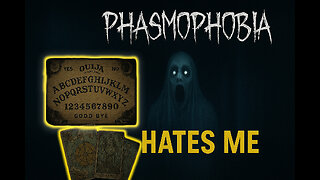Premium Only Content

Religious Controversy #religion #truth #trapgospel #biblestudy #biblereading
https://www.etsy.com/shop/BlackJesusImages
Consider all links affiliate links
Black Jesus Coloring Books - https://amzn.to/3WJjsBR
AI Video Creator - https://paykstrt.com/42278/129400
Free AI Writing For YouTube Videos- https://chat.openai.com/chat
Free AI Pictures - https://openai.com/dall-e-2/
Free Video And Pictures - https://www.canva.com/
Free Amazon KDP - https://kdp.amazon.com/en_US/create
This I All you need to make significant amounts of content for Amazon KDP, YT Scripts, Blog Posts, etc.
Free Keywords to download directly from your competitor's YT Videos and Free AI YouTube Descriptions - https://vidiq.com/aimarketing
BookBolt has unlimited downloadable notebook interiors, Word Search Creator, Multiple Puzzle Creators, and a streamlined process for uploading books to amazon- https://bookbolt.io/3069.html
Free Keywords to download directly from your competitor's YT Videos and Free AI YouTube Descriptions - https://vidiq.com/aimarketing
#blackjesus #religion #truth #trapgospel #biblestudy #biblereading
Hello and welcome to the Black Jesus Research channel. In today's video, we're going to be discussing a topic that has long been a source of controversy in the field of linguistics and biblical translation: the absence of the word "black" in ancient Hebrew.
Now, according to basic language evolution theory, words for colors are among the first that a child learns, and they tend to be among the most stable and enduring in a language. This is because the perception of color is universal, and it is an important part of the way humans communicate and understand the world around them.
So, you might be wondering, why is the word "black" conspicuously absent from ancient Hebrew? Some scholars have suggested that the word simply did not exist in the language, while others have argued that it was deliberately excluded or suppressed for some reason.
There are several examples in the Bible where the word "black" might be expected to appear, but it is instead translated as some other term. For instance, in the book of Exodus, Pharaoh's heart is described as being "hardened" or "made stubborn," which some scholars have interpreted as a metaphor for "blackness" or "darkness." Similarly, in the book of Job, the biblical character is described as being "covered in darkness," which could potentially be translated as "covered in blackness."
The lack of a word for "black" in ancient Hebrew has also raised questions about the physical appearance of biblical characters and figures, such as Jesus and the ancient Israelites. Some scholars have suggested that these characters may have been depicted as having dark skin, while others have argued that they were more likely to have had a more Mediterranean or Middle Eastern appearance.
So, what does all of this mean? Well, the absence of the word "black" in ancient Hebrew is a mystery that may never be fully resolved. It is possible that the word simply did not exist in the language, or that it was deliberately excluded or suppressed for some reason. Whatever the case may be, it is clear that the translation of the Bible has been a complex and often controversial process, and that there are still many mysteries and ambiguities surrounding the ancient text.
If you found this video interesting and want to learn more about black Jesus research, make sure to subscribe to our channel and hit the notification bell to stay up-to-date on all of our latest videos. And if you really want to support our work, consider becoming a patron on Patreon. Your support helps us to continue our research and bring important new insights to the table. Thank you for watching.
-
 1:04:01
1:04:01
BonginoReport
5 hours agoLefties Wish Death on Trump but He’s BACK! - Nightly Scroll w/ Hayley Caronia (Ep.125)
150K55 -
 LIVE
LIVE
Tundra Tactical
2 hours ago $0.15 earnedWe Survived the Military… But Not This Basement
71 watching -
 20:12
20:12
Clownfish TV
10 hours agoDisney Needs MEN Back?! They ADMIT Star Wars and Marvel are DEAD!
67318 -
 LIVE
LIVE
Anthony Rogers
9 hours agoEpisode 381 - Tim Kelleher
43 watching -
 1:01:42
1:01:42
The Nick DiPaolo Show Channel
7 hours agoTDS Hits New Level! | The Nick Di Paolo Show #1786
35.5K30 -
 1:02:27
1:02:27
Michael Franzese
4 hours agoFace to Face with a Former Chinatown Gangster Turned NYPD Detective
37.5K12 -
 1:31:25
1:31:25
The Confessionals
10 hours agoThe Queen of Heaven Exposed (Hathor, Lilith & Ancient Gods Return)
21.9K5 -
 LIVE
LIVE
LFA TV
16 hours agoLFA TV ALL DAY STREAM - TUESDAY 9/2/25
681 watching -
 LIVE
LIVE
LIVE WITH CHRIS'WORLD
7 hours agoLIVE WITH CHRIS'WORLD - IT WORKED IN D.C. & IT WILL WORK IN CHICAGO
47 watching -
 40:44
40:44
Ohio State Football and Recruiting at Buckeye Huddle
6 hours agoOhio State Football: 10 Things We Learned From Rewatching the Texas Win
13.3K